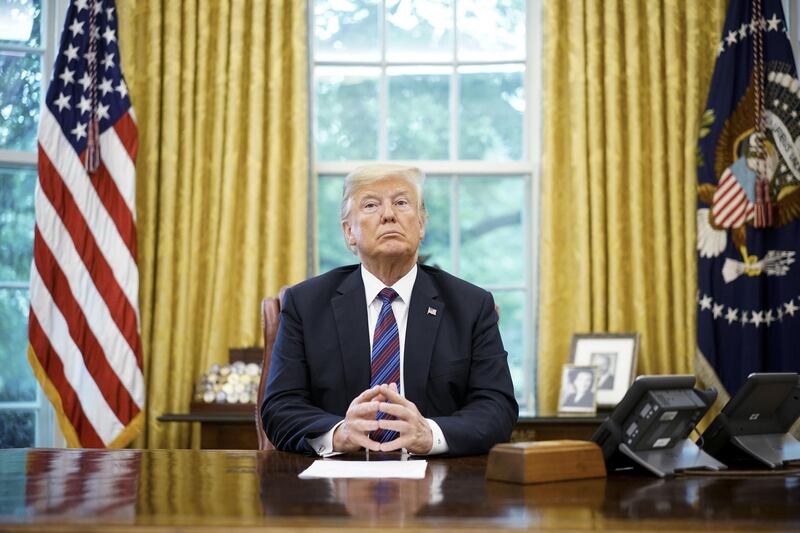Washington's stated rationale for halting funding to the UN agency that serves five million registered Palestinian refugees is that its business model and fiscal practices are "irredeemably flawed".
But given the past pattern of Trump administration practices, including its unilateral recognition of Jerusalem as Israel's capital, and recent statements of officials, the real motive for seeking to cripple the United Nations Relief and Works Agency appears to be to dictate a solution to the Palestinian refugee issue – the most intractable and charged aspect of the Israeli-Palestinian conflict - in Israel's favour.
In the view of US and Israeli policymakers, UNRWA is identified with Palestinian assertions of their right of return to former homes inside Israel that were lost amid the expulsions and displacement of the 1948 war. UNRWA's establishment in 1949 referenced UN Resolution 194 from a year earlier, which says "refugees wishing to return to their homes and live at peace with their neighbors should be permitted to do so at the earliest practicable date", adding that compensation should be afforded those choosing not to return.
The Palestinian assertion of a right to return is a key negotiating demand that cuts to their core grievance of being made refugees. It also constitutes the single major bargaining chip they would have left in any talks with Israel after they gave up claims to 78 per cent of historic Palestine under the 1993 Oslo agreement.
But the US and Israel want the refugee issue liquidated and view UNRWA's demise as key to that process. "The Americans and Israelis believe the refugee issue is still alive because of UNRWA and want to finish it by finishing UNRWA," said MKhaimar Abusada, a political scientist at Al Azhar University in Gaza City.
UNRWA provides vital health, education and other services to registered refugees in 59 camps in the West Bank, Gaza Strip, Jordan, Lebanon and Syria. The US and Israel argue it perpetuates a culture of dependence and unrealistic dreams of a refugee return and charge that it has grossly inflated the number of refugees by registering all subsequent descendants of those displaced in 1948.
Now they have decided the time is ripe to put a stop to UNRWA and to the refugee issue. US ambassador to the UN Nikki Haley told a Washington audience last Tuesday that the issue of the right of return should be "off the table". She sees no contradiction between this and the US' stated intention of unveiling a plan to reach a negotiated peace.
_______________
Read more:
Editorial: Trump's decision to halt UNRWA funding wrecks hopes for peace
[ UN schools for Palestinians reopen despite US funding cut ]
[ Palestinians say Trump is using 'cheap blackmail' ]
_______________
The US attempt to eliminate the refugee issue is a follow-up to its handling of the Jerusalem issue, which both Ms Haley and Mr Trump said was taken "off the table" by the US president's recognition of Jerusalem as Israel's capital in December. That came despite Palestinian claims to East Jerusalem as the future capital of their own state.
Mr Trump repeated this argument at a political rally last month, but held out the hope of “something very good” for the Palestinians in return, saying Israel would have to "pay a higher price" in future negotiations because it had "won a very big thing".
"They are trying to liquidate these issues by taking the position of one side, which is very provocative to the Palestinians," said Ghassan Khatib, vice president of Bir Zeit University in the West Bank. "This is why the Palestinian leadership says the US is not qualified to lead."
Mr Khatib stressed that the UNRWA funding cut-off "will on the humanitarian level take us to further suffering of Palestinian refugees, which will lead to further radicalisation. When the young don't get education and services, this will push them in the wrong direction."
If the decision, which comes days after the US halted $200 million of aid to the Palestinian Authority, is meant to pressure Mr Abbas to return to US-led negotiations, Washington is in for a disappointment, Mr Abusada said. "There is no way Abu Mazen is going to go back to the negotiating table now. He has decided he doesn't want to finish his career by giving in to US pressure."
In the short term, UNRWA's collapse could be staved off by more European and Gulf funding, he said. "The US move will affect its ability to function but its too early to speak of UNRWA's collapse or to say the Palestinian refugee issue is finished."





